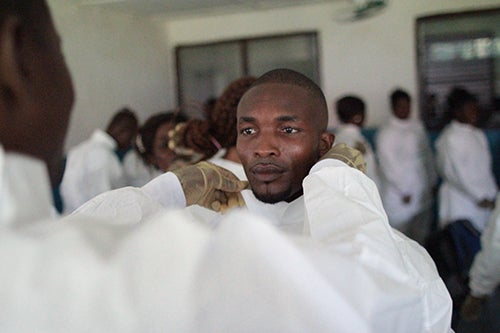
It’s been a difficult year for the people of Guinea, Liberia and Sierra Leone, and all those fighting to end the terrible Ebola epidemic that took thousands of lives, spread fear and destabilized economies. Though the global response to this crisis was too slow, at year’s end, there are hopeful signs that international mobilization is having an impact, and that the countries most affected by the disease are coalescing around the goal of “zero cases.”
Earlier this month, I had the opportunity—along with World Bank Group President Jim Yong Kim — to travel to Guinea, Liberia, Sierra Leone, Senegal and Mali and talk with government leaders, health care workers, development partners, community mobilizers and residents responding to the crisis.
Though the three most affected countries now have a more mature response capacity in place, as compared to a few months ago, I saw the most visible signs of progress in Liberia, where the epidemic has slowed significantly since its high point over the summer.
Liberia’s national response is moving forward in a concerted and organized way, with strong support from international partners. President Johnson Sirleaf’s ambitious vision of “getting to zero” by Christmas, though the goal won’t be reached, sent the right message to Liberia’s citizens and the world. The government is also well into planning for economic recovery. This is especially critical in light of a recent World Bank Group economic impact study that forecasts negative or contracting economic growth next year across the countries hardest hit by Ebola.
But there remains much to be done: The country is still seeing 10 new Ebola cases every day – that’s 10 too many.
Across the region, I was also impressed with the growing recognition of the fundamental role community ownership plays in the Ebola response. Governments are engaging community members and religious leaders as change agents and educators, drawing on local social capital to convey life-saving health messages. This approach worked especially well in Senegal, which contained its one case of Ebola and prevented further spread in part by channeling health messages through a network of rural women’s cooperatives.
I also traveled to Mali, where the government engaged religious leaders in contact tracing and education following the public funeral of an imam who had died of Ebola, during which thousands of people had touched the corpse. Mali’s cluster of Ebola cases now appears to be contained.
Community mobilization will continue to be essential in ramping up contact tracing across the region in the next phase of the response -- a key step in reaching the goal of zero Ebola cases.
A year into this epidemic, it’s important to look back and understand why the global health community was caught unprepared. Why did we allow a fire to burn out of control? What have we learned?
First, the crisis has underscored the imperative of investing in universal health coverage and robust health systems, which must include the essential public health functions of monitoring, surveillance and education. Ebola emerged this time in the remote, forest region of Guinea, where health systems are weak and access extremely limited. Where people have no access to health care, diseases can fester and spiral out of control. Where health systems are weak, there is no mechanism to catch and report disease outbreaks at an early stage. When large populations go uncovered, it’s at the world’s peril.
Second, we need to take global pandemic preparedness much more seriously. Not only do we need stronger health systems, we need to ensure that our global health institutions are fit-for-purpose and can respond in a much more timely and effective way, with the right skills and competencies. Securing the resources to maintain and mobilize a global response is not a choice but an imperative.
On this front, the World Bank Group is developing a proposal for a Global Pandemic Emergency Facility that would ensure the necessary financing can be mobilized immediately once a pandemic trigger point is reached. We look forward to working with the U.N., the International Monetary Fund, regional development banks and other global donors to make this facility a reality in 2015.
Ebola’s lessons in the past 12 months came at a human and economic cost that no family, community, nation, continent or global community can afford. In the New Year, we must be resolute in our determination to get to zero Ebola cases – the sooner the better – and we must resolve to act on these lessons now to better prepare and respond to future epidemic threats.
Follow the World Bank health team on Twitter: @WBG_Health
Related
World Bank and Ebola Response
Ebola Response Fact Sheet
World Bank and Pandemics

Join the Conversation